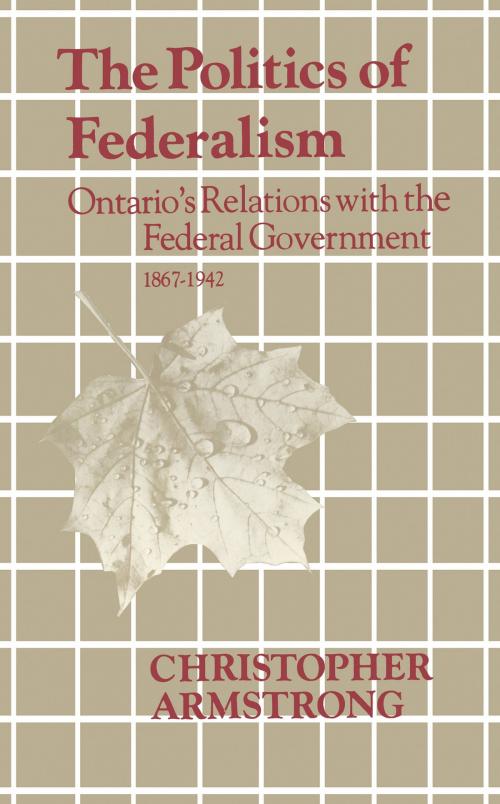The Politics of Federalism
Ontario's Relations with the Federal Government. 1867-1942
Nonfiction, History, Canada, Social & Cultural Studies, Political Science, International| Author: | Chris Armstrong | ISBN: | 9781442633056 |
| Publisher: | University of Toronto Press, Scholarly Publishing Division | Publication: | December 15, 1981 |
| Imprint: | Language: | English |
| Author: | Chris Armstrong |
| ISBN: | 9781442633056 |
| Publisher: | University of Toronto Press, Scholarly Publishing Division |
| Publication: | December 15, 1981 |
| Imprint: | |
| Language: | English |
The British North America Act of 1867 fashioned a Canadian federation which was intended to be a highly centralized union led by a powerful national government. Soon after Confederation, however, the government of Ontario took the lead in demanding a greater share of the power for the provinces, and it has continued to press this case. Professor Armstrong analyses the forces which promoted decentralization and the responses which these elicited from the federal government. He explains Ontario's reasons for pursuing this particular policy from 1867 to the Second World War.
The author's sources are the private papers of federal and provincial premiers and other contemporary political figures, government publications, parliamentary debates, and newspapers. He has identified and developed three separate but related themes: the dynamic role played by private business interests in generating intergovernmental conflicts; Ontario's policy of promoting its economic growth by encouraging the processing of its resources at home; and the tremendous influence exerted by increasing urbanization and industrialization on the growth of the responsibilities of the provinces.
During the 1930s, efforts to restructure the federal system were rejected by Ontario because it preferred to maintain the status quo,and was unsympathetic to greater equalization between the regions. Consequently, Ontario took a leading part in opposing the redivision of powers recommended by the Royal Commission on Dominion-Provincial Relations in 1940.
This book provides part of the historical context into which current debates on the question of federalism may be fitted. It thus will be of importance and interest to historians, students of Canadian history, and the general reader alike.
(Ontario Historical Studies Series: Themes)
The British North America Act of 1867 fashioned a Canadian federation which was intended to be a highly centralized union led by a powerful national government. Soon after Confederation, however, the government of Ontario took the lead in demanding a greater share of the power for the provinces, and it has continued to press this case. Professor Armstrong analyses the forces which promoted decentralization and the responses which these elicited from the federal government. He explains Ontario's reasons for pursuing this particular policy from 1867 to the Second World War.
The author's sources are the private papers of federal and provincial premiers and other contemporary political figures, government publications, parliamentary debates, and newspapers. He has identified and developed three separate but related themes: the dynamic role played by private business interests in generating intergovernmental conflicts; Ontario's policy of promoting its economic growth by encouraging the processing of its resources at home; and the tremendous influence exerted by increasing urbanization and industrialization on the growth of the responsibilities of the provinces.
During the 1930s, efforts to restructure the federal system were rejected by Ontario because it preferred to maintain the status quo,and was unsympathetic to greater equalization between the regions. Consequently, Ontario took a leading part in opposing the redivision of powers recommended by the Royal Commission on Dominion-Provincial Relations in 1940.
This book provides part of the historical context into which current debates on the question of federalism may be fitted. It thus will be of importance and interest to historians, students of Canadian history, and the general reader alike.
(Ontario Historical Studies Series: Themes)















